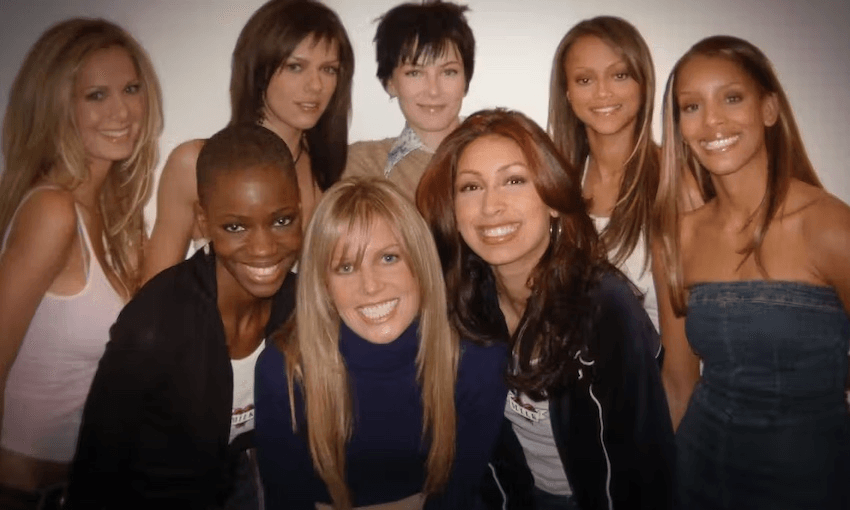Tara Ward gazes back through time to remember TV One’s campaign dog Toby, the goodest boy to ever grace the small screen.
Nothing says “watch this channel” more than a directionally-challenged dog trapped in a labyrinth of notable TV personalities. So it makes perfect sense that when 1991 TV One launched a promo campaign featuring 50 well-known newsreaders and sportspeople, they should also encounter a lost dog and do feck all to get him home again.
Step aside, Judy Bailey. There’s a new Mother of the Nation, and his name is Toby the Shaggy Dog.
90s viewers loved the Toby the Lost Dog ad campaign as much as they loved wearing chambray shirts over turtleneck skivvys. How can you not love these ads? They’re directed by Lee Tamahori! The dog is impossibly cute! Sir Edmund Hillary turns up in a helicopter to save the day! Holy jeans and sneakers, Louis Armstrong was right: this really is a wonderful world.
For five months, our canine hero spread his doggy sunshine through the countryside as TV One weather presenters and sports heroes popped out from behind barbeque tables and bicycles as if they were regular people. Ha! Who were they kidding? Updates of Toby’s travels were eagerly awaited, because what else did we have to do in 1991 than play ‘spot the newsreader behind the dog’? Nothing. We had nothing.
The final promo screened on Christmas Day, straight after the Queen’s Message. It would have brought a tear to the driest of royal eyes. If you weren’t already emotional over the amount of Roses chocolates you’d eaten that day, then Toby and Danni’s reunion would’ve tipped you over the edge.
After all, he was just a dog, standing in front of the nation, asking us to love him.
Our journey begins in Arrowtown, where Danni informs the grocer about her missing dog. First red flag: the level of shits that grocer gives about Toby is minimal. I know it’s too early to point fingers but, tbh, I feel like Grocery Man knows more about this situation than he’s letting on.
Turns out Toby is living it large in Auckland. It’s not important how he got there, what’s important is that Auckland is a wild metropolis where Anita McNaught carries daffodils through the streets, Richard Long wanders aimlessly through shopping arcades and Judy Bailey larks it up as Mother of the Nation. Run for your life Toby, and don’t look back.
The entire city ignores Toby, probably too busy wondering why John Hawkesby goes jogging in jeans and boat shoes.
Meanwhile, a little girl waits.
Toby leaves Auckland to swallow itself whole and hitches a ride into the heartland with old mate Gary McCormick. They part ways when Toby decides against smoking and drinking with Paul Holmes in the Te Aute Hotel. Wise decision Tobes, dogs almost never get served at the bar.
Sam Hunt takes Toby as far as Wellington, a strange place where celebrities hang out at the fish shop. Who knew Maggie Barry and Lindsay Perigo loved fish so much? If Richard Long ever makes it out of that shopping arcade alive, I reckon he’d love it too. Wellington, never change.
And still, a little girl waits.
A desperate Toby begins to make bad decisions. I can’t watch. Wonderful world, my arse.
Toby needs a miracle, which he won’t find grocery shopping with Jeremy Coney. He bumps into The Wizard in Kaikoura and asks to be magicked home to Arrowtown so he can piss all over that thieving grocer’s doorstep.
I CANNOT believe the way the angelic Jude Dobson, of all people, ignores Toby’s plight. Dogs are people too, Jude.
Seasons change, winter is coming, the snow glows white on the mountain tonight. Poor Toby’s about to freeze his doggy tits off, and his blind rage over the whole Jude Dobson situation worsens after Jim Hickey openly snubs him in Tekapo. Let it go, Tobes.
If only, at this crucial moment, a national legend happened to be flying past in a helicopter, and could rescue Toby and drop him home.
Wait, what the-
Danni can’t believe it, I can’t believe it, Richard Long certainly can’t believe it.
Run, Toby, run like the wind! The littlest hobo is home!
That was New Zealand in 1991: we were up to our turtleneck skivvies in canine and country love. Thank you TV One, and in the immortal words of Louis Armstrong, “mmm, yeah.”



